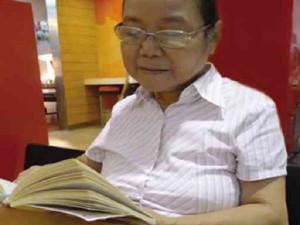Jean Vasquez was a hard worker at the University of the East Ramon Magsaysay Memorial Medical Center. She was a cashier in the outpatient clinic and was accustomed to meeting different types of patients and seeing different types of conditions. For years though, she was able to consider herself lucky as she remained active and healthy. However, when she was 50 years old almost turning 51, she began experiencing joint pains she had never felt before.
Vasquez was used to working and supporting herself, being single and having no children. She had always been strong and resilient. The pain that first began in her left knee made it difficult for her to concentrate on her daily duties like working and maintaining the household. When daily fevers followed accompanied by severe pain, she quickly sought medical attention.
In 2001, she saw her first rheumatologist when the discomfort had already spread quickly. Her knees were painful and her other joints, such as her wrists, had begun to hurt and swell.
Diagnosis
Vasquez’s doctor tested her for rheumatoid arthritis (RA) based on the symptoms. Vasquez was officially diagnosed with RA in 2001, as she was turning 51. She was surprised because she had always been healthy and that her family did not have a history of arthritis.
She was first given oral medications, methotrexate and hydroxychloroquine, steroids and pain relievers. Her RA progressed rapidly. Alongside the worsening pain, she soon started to develop deformities in her joints, which led her to use a splint on her hand. She was also having trouble walking and going to work.
In 2003, Vasquez was referred to Dr. Nympha Ribargoso, a rheumatologist at both UERMMMC and Our Lady of Lourdes Hospital, since her original doctor was then about to migrate abroad. The two doctors collaborated and studied Vasquez’s case and saw that her original medications of methotrexate combined with hydroxychloroquine were not working sufficiently for her.
She still had multiple joint pains and swelling, joint stiffness, anemia and her erythrocyte sedimentation rate (ESR, or the measurement of protein associated with inflammation) was between 90 and 112. “We needed to try her on something else,” recalled Ribargoso.
Intravenous medication
Vasquez received her first intravenous medication, infliximab infusion, in 2004. Infliximab is an anti-TNF alpha, one of the first biologic treatments that became available for RA in the country. She finished nine doses of the medicine. The joint pain and stiffness decreased and her anemia improved. Her ESR also went down to 80. It was good, but it did not last. After six months the RA symptoms were back.
Ribargoso decided to try another round of infliximab in 2005, wherein Vasquez once again finished nine doses. She saw some improvements that lasted for a year. But the pain was still there and she still needed steroids and painkillers.
In 2008, Ribargoso tried Vasquez on etanercept injections for 10 months. There was progress on her joint pain, swelling and stiffness. Her ESR, however, remained high. Again they were not satisfied with the results.
Other treatments
Since Vasquez was not responding well enough to the anti-TNF medications (infliximab and etanercept), Ribargoso looked for other possible treatments like the use of anti-B lymphocyte, rituximab or the newer biologic agent at the time which is an anti-IL-6, tocilizumab. They decided to try tocilizumab.
Ribargoso said: “The three years of anti-TNF medications had exhausted Vasquez’s funds and we had to wait for a while before beginning the treatment. During this time, her pain and swelling worsened. She was experiencing severe pain in her knees and shoulders and her orthopedic surgeon already told her she would need bilateral total knee surgery which she was already planning to schedule.”
In May 2010, Vasquez received her first dose of tocilizumab. Her ESR prior to the first treatment was 100 and her hemoglobin was 96. By her second infusion, her ESR was already 31 and her hemoglobin was 117. Her joint pains and swellings have subsided. It was the best improvement she had seen from her medications and she was very happy.
Vasquez said: “Prior to the treatment, I had been on a cane and had difficulty walking and moving around. But after my first few infusions of tocilizumab, I could walk longer, I felt immediate relief and I could even go up the stairs. I started to feel a little like my old self.”
Living life normally
Finding the right treatment was the most important step in helping Vasquez got back to the life she knew before she was diagnosed with RA. The tocilizumab continued to work on her until she finished a round of six monthly infusions. Her joint pains and swelling disappeared, no longer needing her steroids or the two additional painkillers she had taken previously. Her ESR remained at 30-40 levels and her hemoglobin remained normal.
Due to the improvements on her treatment, her knee surgery did not push through and she continued to walk with more ease.
The six-month round of tocilizumab treatment continues to work up to the present. Vasquez is now 63 and enjoying her retirement—just spending her time with her family and reading books. She goes in for a checkup every three months and continues to do well.
